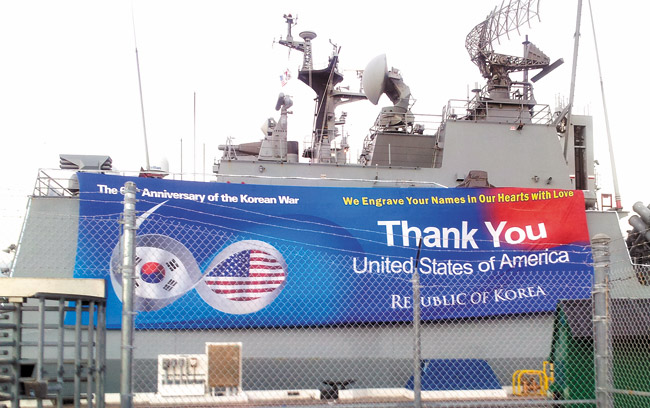A Sign Of Appreciation For U.S.
The anniversary of the Korean War. We engrave your names in our hearts with love. Thank you United States of America. Republic of Korea.”
Just when you think no one appreciates the United States overseas, an emotional “love letter” comes from, of all places, a ship in Pearl Harbor.
The end of the Korean War, the “Forgotten” War as it’s nicknamed, turned 60 this past Veterans Day. Yet, the birthday of the end of this brutal, bloody and, as we see today, crucial war didn’t get much of a hurrah on a busy news day. It was greeted with a whimper, not the bang it deserved.
So when I saw this photo my husband, Jerry, took a couple of weeks ago, it was a small reminder of something we rarely hear: Thank you, United States of America. We know what you did for us. We know what life would’ve been like without your sacrifice of lives and treasure. Thank you.
Wow.
Americans ordinarily don’t require thank-yous (or get them). Most of us appreciate that we live in a blessed nation of privilege, resources
and unique freedoms crafted by a brilliant few. Most of us know we enjoy something special that attracts envy and immigrants.
But a thank-you never hurts.
The banner, in fact, caused me to choke up. The rarity of such a thank-you grabbed me as I thought of all those young American soldiers who, 60 years post-war, will spend their Christmas in the frigid Republic of Korea (ask Korean War vets about winters there).
A 2.5-mile-wide demilitarized zone, protected in part by 28,500 U.S. soldiers, can’t help but remind 50 million South Korean citizens of how their country might look if the U.S. and other U.N. forces had not ultimately thwarted a North Korean communist invasion in June 1950. The war ended in a truce, not a treaty, so in essence a Korean “cold war” is punctuated not by bullets, but an ongoing military buildup, secrecy and blustering nuclear threats.
Since the Korean War, hundreds of thousands of North Koreans have been executed, a million-plus killed in labor and concentration camps, and also starved in a regime-inflicted famine. North Korean children who’ve escaped and defected are so malnourished that, at age 18, they’re reported to be 5 inches shorter than South Koreans of the same age. The North’s human rights violations are so severe as to provoke a possible accusation of “crimes against humanity” by the U.N., toothless as that may prove.
Many believe that, were it not for the sacrifices of Korean War veterans, the entire Korean peninsula would be living under the oppression of Kim dynasty’s tyrannical North Korean rule. In 1953, South Korea was a destitute nation. Today, it ranks as the world’s 12th richest. Back then a person’s annual income was $65. Today, it’s around $32,000. From 1946 to 1978 the U.S. gave South Korea $60 billion in foreign aid. Now South Korea donates, giving as much as $1 billion in aid to poor nations. And who hasn’t heard of Samsung?
Since 2011 and North Korea’s imperious young President Kim Jong II’s nuclear threats against both Korea and the U.S., South Korean citizen protests against U.S. military presence there are few. (But what’s a democracy without protests?) In Korea’s dangerous yet pragmatic standoff, U.S. military presence clearly ensures peace for the South.
For your gracious thank-you, Republic of Korea, you’re quite welcome. * About 52,000 troops still fight in Afghanistan in America’s longest war, Enduring Freedom. Since 2001, 3,397 Americans have died there, 1,662 in the past five years. Countless others have suffered serious wounds, traumatic brain injury, loss of limbs, burns and PTSD. How long freedom will endure there remains to be seen. We won’t hold our breath for thank yous from Iraq for ridding it of Saddam Hussein, or Afghanistan for enabling girls to go to school. Iraq is awash in civil strife as extremists try to reclaim it. Afghanistan has yet to decide if American troops are “welcome” there past next year.
But despite the politics of war, this Christmas remember to say thank you to our troops stationed around the world, who do their duty not for the thanks, but to preserve and promote freedom.
For a listing of ways to say thank you, go to military.com and search Support Our Troops.
susanpagecoffee@gmail.com






